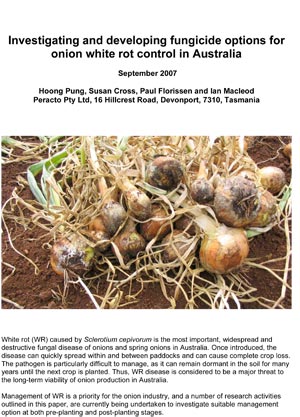|
White Rot disease caused by Sclerotium cepivorum is the most important, widespread and destructive fungal disease of onions and spring onions in Australia.
Once introduced, the disease can quickly spread within and between paddocks and can cause complete crop loss.
The pathogen is particularly difficult to manage, as it can remain dormant in the soil for many years until the next crop is planted.
Thus, White Rot is considered to be a major threat to the long-term viability of onion production in Australia.
Management of White Rot is a priority for the onion industry, and a number of research activities outlined in this paper, are currently being undertaken to investigate suitable management option at both pre-planting and post-planting stages.
Authors
|
| Hoong Pung |
Susan Cross |
| Paul Florissen |
Ian Macleod |


Investigations :
- Fungicide options for white rot are currently limited and identification of alternative fungicides for commercial use on onions is seen as a priority for the onion industry in Australia.
Additionally, application methods for delivering fungicides to the onion bulb and roots are vital, and yet have been very difficult to achieve.
As such, this research aims to evaluate and develop effective fungicide treatments and application methods for white rot control.
- Investigations were conducted into alternative WR treatments to be applied at the sowing stage.
In Tasmania, onion growers rely solely on the use of Folicur (tebuconazole) – lime super treatment, whereby Folicur is first mixed with lime super and then applied with triple super fertiliser at sowing with seed.
This method, developed in the 1990s, has been shown to provide early control of the disease for up to 200 days.
But in recent years, poor control has been noted at less than 100 days.
The causes of these inconsistencies in disease control created the basis of the investigation.
- In 2006, the major fertiliser suppliers in Tasmania indicated that they would cease producing lime super for growers in 2007.
This means that the onion growers will have to switch from lime super to single super fertiliser.
Previous research had consistently shown that Folicur applied onto other types of fertilisers was less effective than Folicur-lime super treatment.
Clearly, improved fungicide coating and distribution methods, and suitable alternative carriers have to be dealt with in order to address the concerns on adequate fungicide levels and disease control.
Acknowledgements :
These research studies were conducted as project VN05007 and project VN05010, which are facilitated by the Australian Onion Industry Association and Horticulture Australia Limited.
These projects are funded by Australian onion growers and voluntary contributions from Bayer CropScience Pty Ltd, Nufarm Australia Limited, Syngenta Crop Protection Pty Ltd and DuPont (Australia) Pty Ltd, with matching funds from the Australian government through Horticulture Australia Ltd.
|

